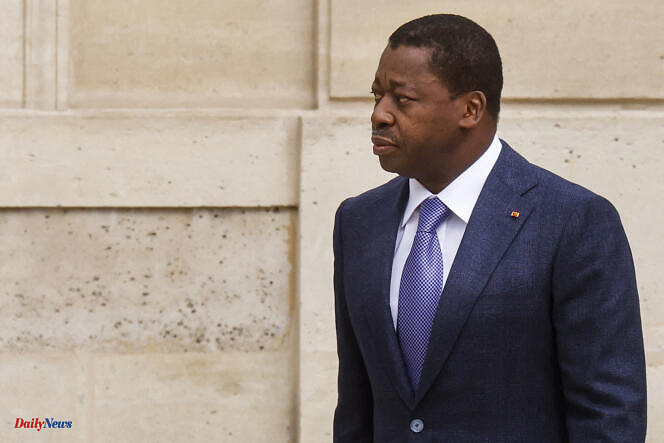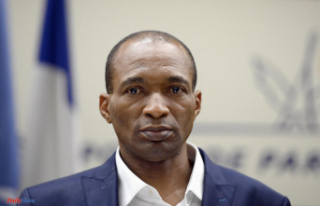It only took one night for Togo to discreetly change its regime and Constitution. While all eyes were on the presidential election in Senegal, largely won by opponent Bassirou Diomaye Faye, Togolese deputies voted on March 25, at past 11 p.m., for a modification of the fundamental law which establishes a parliamentary regime. An institutional upheaval designed, according to the opposition, to allow the head of state, who succeeded his father in 2005, to remain at the head of the country indefinitely.
The adopted text, which comes from a group of nineteen deputies from the UNIR party (Union for the Republic), some of whom are very close to the palace, was designed to strengthen the weight of the head of government, to the detriment of that of the president. of the Republic. The latter, elected “without debate” for a single mandate of six years by Parliament meeting in congress, now has only an honorary role. Real power is concentrated in the hands of a “president of the council of ministers” appointed by the National Assembly, with no term limit.
Head of the armed forces and responsible for foreign policy, this “super prime minister” decides on the country’s major directions. A position which seems cut out for the current head of state and which could fall to him, if his party wins the next legislative and regional elections scheduled for April 20.
“It all happened on the sly, while everyone was asleep. We knew, since mid-March, that a bill was in preparation, but we were far from imagining that we were going to completely change the regime,” chokes up Isabelle Ameganvi, former MP and vice-president of the National Alliance for Change (ANC), one of the main opposition parties. “As I speak to you, I have not yet had access to the voted text! », she continues, shocked by the process.
“The head of state wants to give himself a new lease”
For this trained lawyer, the law, which has yet to be promulgated, is all the more problematic because it “violates” article 59 of the Constitution, according to which the method of election of the President of the Republic cannot be changed only by referendum. Furthermore, the mandate of the deputies officially expired on January 7. “They should have just dealt with business as usual. It is not up to 89 people who were poorly elected five years ago [1 MP voted against, 1 other abstained] to decide for 5 million Togolese voters! The country's problem is not its political regime, it's that the authorities do not respect the law,” she asserts.
Officially, the new Constitution is supposed to “bring new impetus to the management of public affairs”, we can read on the National Assembly website. But why then opt for a parliamentary regime and not amend the 1992 text as was already done in 2002, 2007 and 2019 to, according to the opposition, allow the leader in place to run again after one or more mandates in arguing for a reset of the counters?
“There have been no real debates on this point, or any debates at all, because the nature of the regime is just a legal guise for the balance of political power. It is very clear that the head of state wants to give himself a new lease of life,” said Togolese economist Kako Nubukpo, commissioner for agriculture at the West African Economic and Monetary Union (UEMOA) and former minister of President Faure Gnassingbé. Contacted by Le Monde, the Minister of Communication and government spokesperson, Florence Kouigan, did not respond.
Faure Gnassingbé, “the young dean”
Since 1967, Togo has only had two presidents: Gnassingbé Eyadéma, a former soldier in the French army who became head of state following a putsch and who remained there until his death. in 2005, then his son, Faure Gnassingbé, comfortably re-elected in 2010, 2015 and 2020.
At 57 years old, "the young dean", as his peers in West Africa call him, appears to be one of the best established in power, while the sub-region has experienced, over the last three years, a series of putsches in Mali, Burkina Faso, Guinea and Niger. Regimes sanctioned by the Economic Community of West African States (ECOWAS), but with which Togo has always strived to maintain contact, to the point of becoming one of the main mediators in the crises that are shaking the region.
Did the Togolese government want to capitalize on the distrust inspired today by the democratic model which was deployed in West Africa from the 1990s and of which military regimes are today the main gateways? -voice ? “It is in the spirit of the times to criticize the failures and fragility of representative democracy. One of the arguments put forward by the UNIR party to justify the need to move to parliamentary governance is that this new regime would be a guarantee of stability and a model more suited to African societies. Which is in no way established,” underlines Kako Nubukpo.
The opposition, which seeks to mobilize public opinion against what it considers to be a constitutional coup, has little room for maneuver. A press conference was organized on Wednesday March 27 in the capital, Lomé, with representatives of civil society to denounce the authorities' “misrepresentation”. But another meeting, which was to be held earlier, was interrupted by the police under the pretext that its organizers did not have the necessary authorizations.












